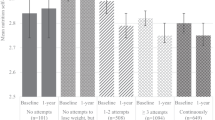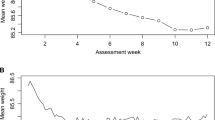Abstract
One-month weight loss (WL) predicts posttreatment WL in face-to-face interventions; however, whether this holds true within Internet programs is unknown. This study examined whether 4-week WL predicts WL following a 12-week Internet program and at 6 and 12 months follow-up. A total of 181 participants (body mass index=33.4±5.5 kg m−2; 83.1% female) received a 12-week behavior-based Internet WL program consisting of weekly video lessons. Participants were given a daily WL, calorie and physical-activity goal and asked to enter these data on the study website weekly. Personalized feedback was provided. Using 4-week WL, individuals were categorized as ‘early nonresponders’ (<2.0% WL) or ‘early responders’ (⩾2.0% WL). Early nonresponders had significantly lower WL than early responders at 3 (−1.3±3.8% vs −6.3±4.3%), 6 (−1.7±5.1% vs −5.8±5.2%) and 12 months (−0.05±6.8% vs −2.7±6.3%, P<0.05). The odds of achieving a ⩾5% WL were 8.5 (95% confidence interval (CI), 3.3–22.1), 3.4 (95% CI, 1.4–8.3) and 2.6 (95% CI, 0.93–7.4) times lower in early nonresponders, compared with early responders at 3, 6 and 12 months, respectively. Compared with early responders, early nonresponders viewed fewer video lessons and self-monitored less often across the 12-week intervention (P<0.05). This study provides initial evidence that a 4-week WL of <2.0% places an individual at an increased risk of failing to achieve clinically significant WL following an Internet program.
This is a preview of subscription content, access via your institution
Access options
Subscribe to this journal
Receive 12 print issues and online access
$259.00 per year
only $21.58 per issue
Buy this article
- Purchase on Springer Link
- Instant access to full article PDF
Prices may be subject to local taxes which are calculated during checkout


Similar content being viewed by others
References
Unick JL, Hogan PE, Neiberg RH, Cheskin LJ, Dutton GR, Evans-Hudnall G et al. Evaluation of early weight loss thresholds for identifying nonresponders to an intensive lifestyle intervention. Obesity 2014; 22: 1608–1616.
Nackers LM, Ross KM, Perri MG . The association between rate of initial weight loss and long-term success in obesity treatment: does slow and steady win the race? Int J Behav Med 2010; 17: 161–167.
Unick JL, Neiberg RH, Hogan PE, Cheskin LJ, Dutton GR, Jeffery R et al. Weight change in the first two months of a lifestyle intervention predicts weight changes 8 years later. Obesity (Silver Spring) 2015; 23: 1353–1356.
Carels RA, Wott CB, Young KM, Gumble A, Darby LA, Oehlhof MW et al. Successful weight loss with self-help: a stepped-care approach. J Behav Med 2009; 32: 503–509.
Wadden TA, Butryn ML, Wilson C . Lifestyle modification for the management of obesity. Gastroenterology 2007; 132: 2226–2238.
Harvey-Berino J, West D, Krukowski R, Prewitt E, VanBiervliet A, Ashikaga T et al. Internet delivered behavioral obesity treatment. Prev Med 2010; 51: 123–128.
Morgan PJ, Callister R, Collins CE, Plotnikoff RC, Young MD, Berry N et al. The SHED-IT community trial: a randomized controlled trial of internet- and paper-based weight loss programs tailored for overweight and obese men. Ann Behav Med 2013; 45: 139–152.
Krukowski RA, Harvey-Berino J, Bursac Z, Ashikaga T, West DS . Patterns of success: online self-monitoring in a web-based behavioral weight control program. Health Psychol 2013; 32: 164–170.
Tate DF, Wing RR, Winett RA . Using Internet technology to deliver a behavioral weight loss program. JAMA 2001; 285: 1172–1177.
Leahey TM, Thomas G, Fava JL, Subak LL, Schembri M, Krupel K et al. Adding evidence-based behavioral weight loss strategies to a statewide wellness campaign: a randomized clinical trial. Am J Public Health 2014; 104: 1300–1306.
Hutchesson MJ, Rollo ME, Krukowski R, Ells L, Harvey J, Morgan PJ et al. eHealth interventions for the prevention and treatment of overweight and obesity in adults: a systematic review with meta-analysis. Obes Rev 2015; 16: 376–392.
Brownell KD . Public health approaches to obesity and its management. Annu Rev Public Health 1986; 7: 521–533.
Leahey TM, Subak L, Fava JL, Schembri M, Thomas JG, Xu X et al. Benefits of adding small financial incentives or optional group meetings to a web-based statewide obesity initiative. Obesity 2015; 23: 70–76.
Pi-Sunyer X, Blackburn G, Brancati FL, Bray GA, Bright R, Clark JM et al. Reduction in weight and cardiovascular disease risk factors in individuals with type 2 diabetes: one-year results of the look AHEAD trial. Diabetes Care 2007; 30: 1374–1383.
Acknowledgements
We acknowledge Katie Krupel and Mona Xu of the Weight Control and Diabetes Research Center for all of their efforts on this study. We also recognize the contributors from Shape Up Rhode Island: Rajiv Kumar, Brad Weinberg, Robert Vitek and Jenna Lafayette. This study was supported by grant DK083248 from the National Institute of Diabetes and Digestive Kidney Disease.
Author information
Authors and Affiliations
Corresponding author
Ethics declarations
Competing interests
The authors declare no conflict of interest.
Additional information
Supplementary Information accompanies this paper on International Journal of Obesity website
Supplementary information
Rights and permissions
About this article
Cite this article
Unick, J., Leahey, T., Kent, K. et al. Examination of whether early weight loss predicts 1-year weight loss among those enrolled in an Internet-based weight loss program. Int J Obes 39, 1558–1560 (2015). https://doi.org/10.1038/ijo.2015.89
Received:
Revised:
Accepted:
Published:
Issue Date:
DOI: https://doi.org/10.1038/ijo.2015.89
This article is cited by
-
Consistent self-monitoring in a commercial app-based intervention for weight loss: results from a randomized trial
Journal of Behavioral Medicine (2020)
-
Initial Weight Loss Response as an Indicator for Providing Early Rescue Efforts to Improve Long-term Treatment Outcomes
Current Diabetes Reports (2017)
-
A preliminary investigation into whether early intervention can improve weight loss among those initially non-responsive to an internet-based behavioral program
Journal of Behavioral Medicine (2016)



